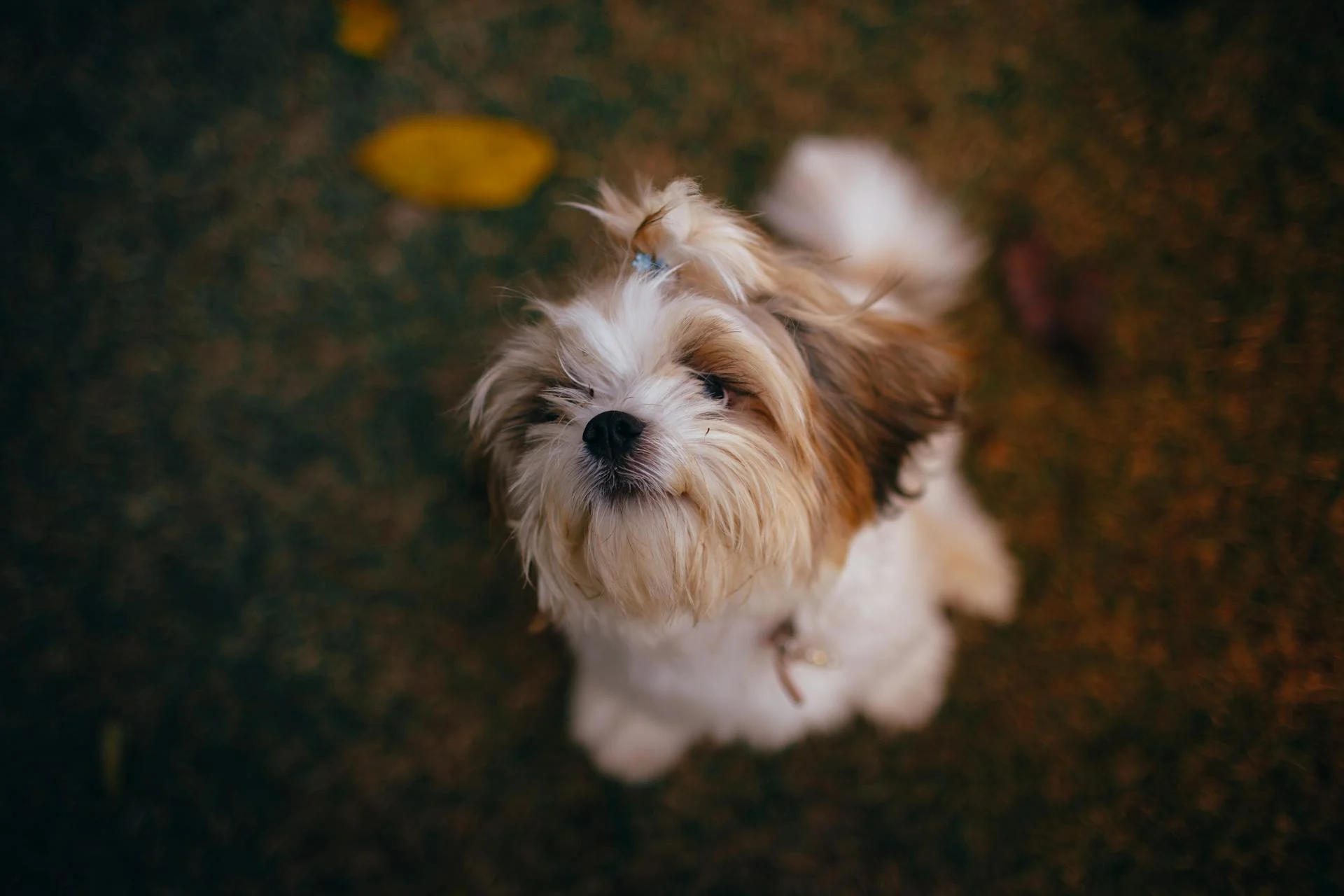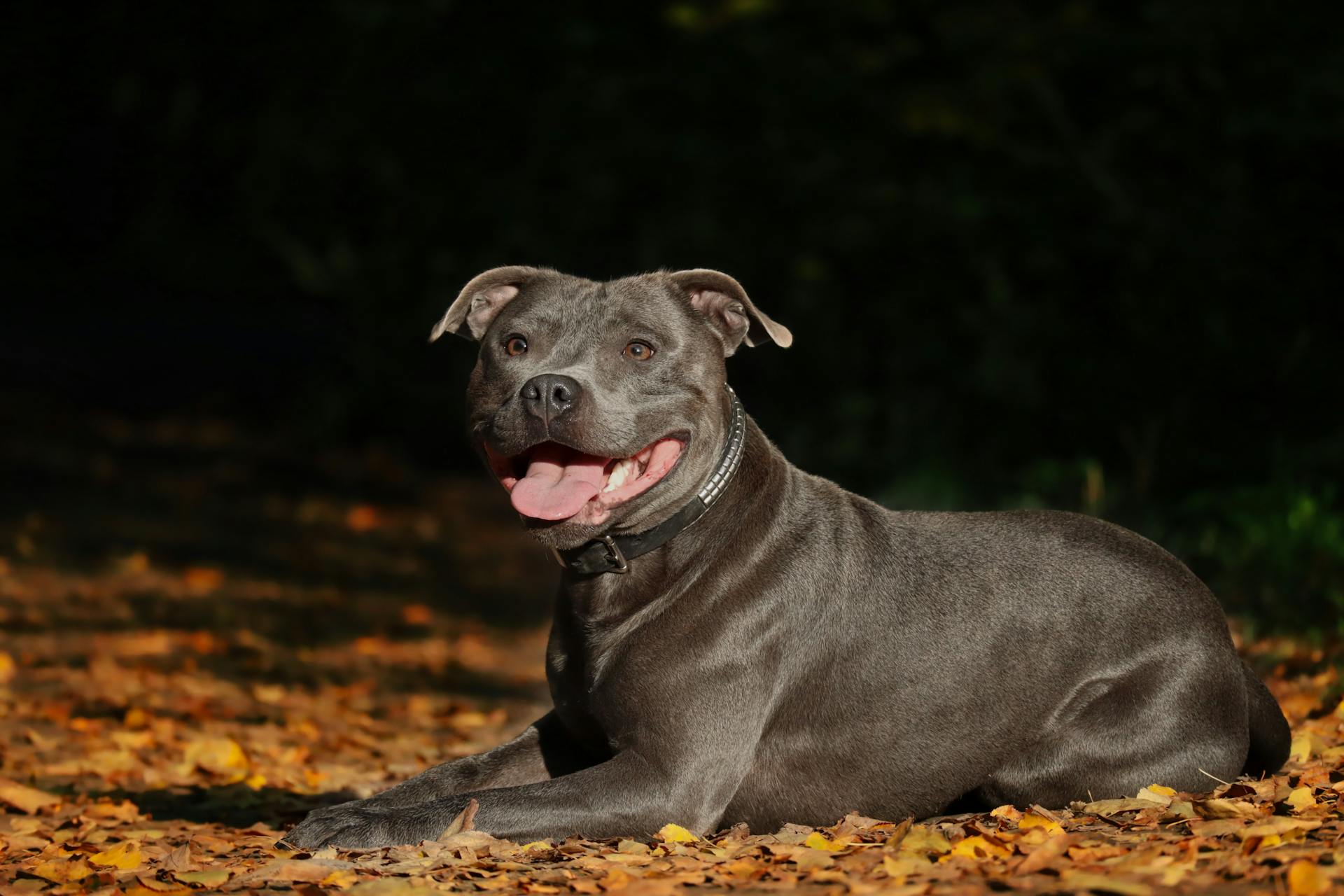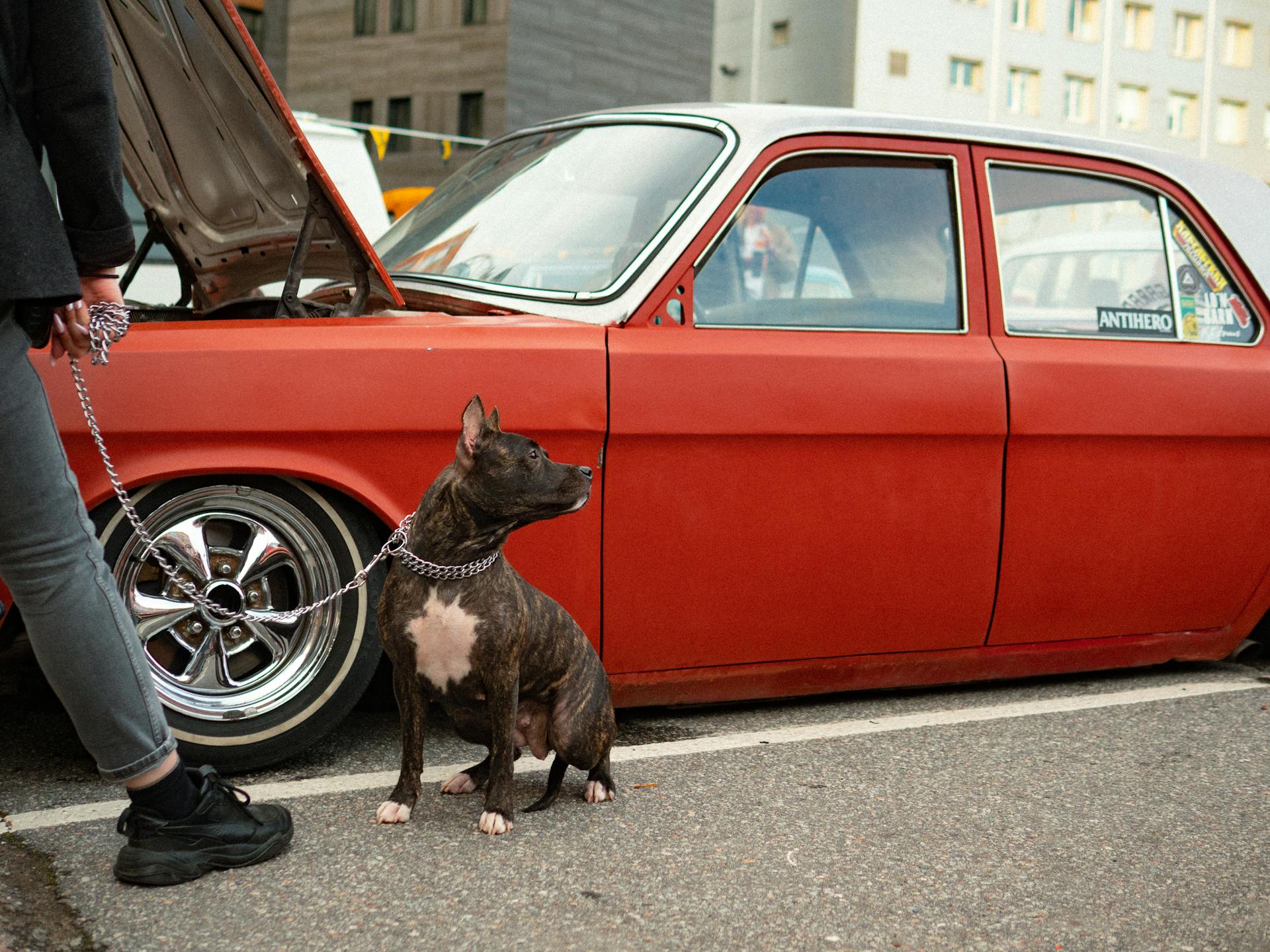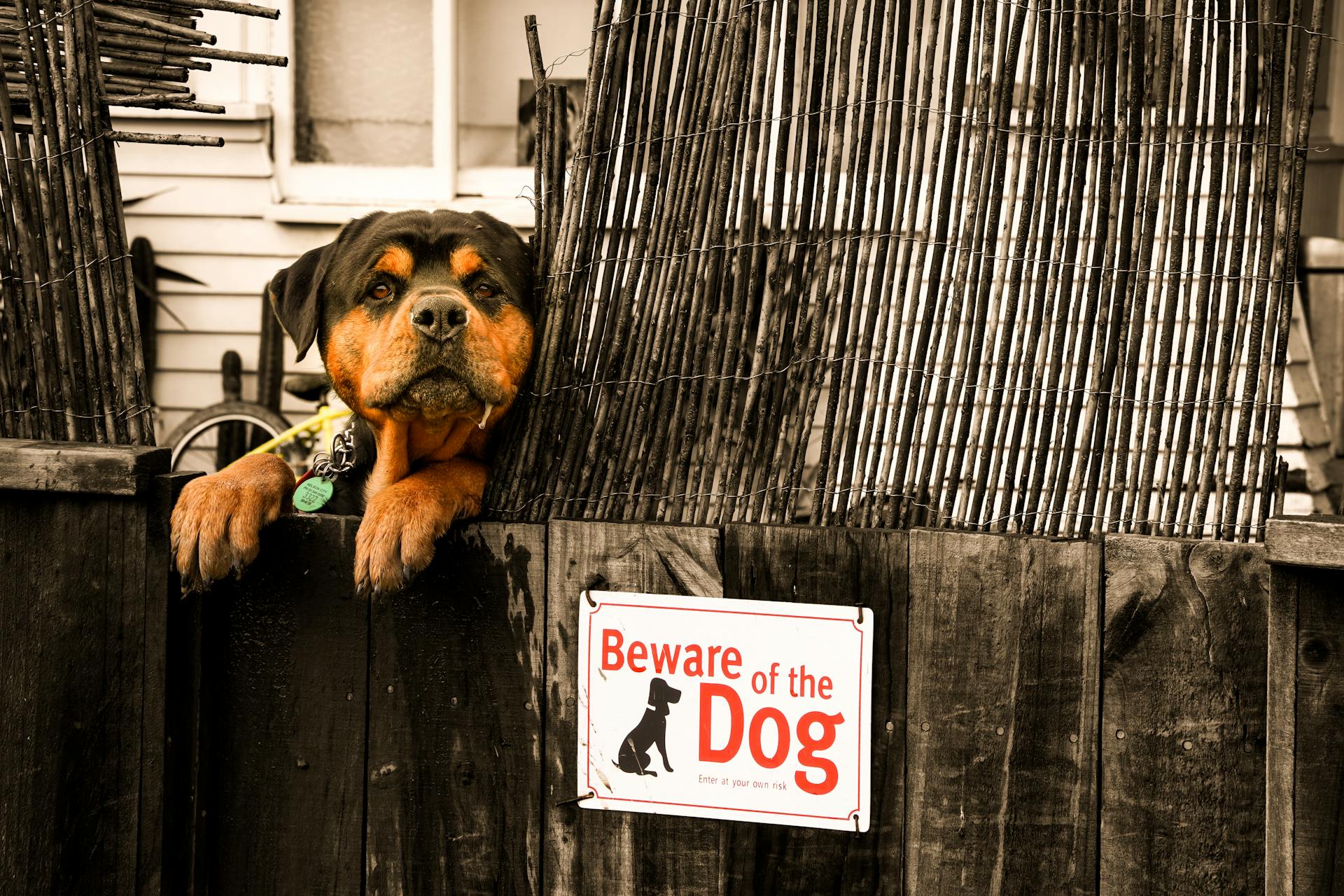
If you're considering bringing a Rottie Cross Husky into your family, you're probably wondering what to expect. They are a high-energy breed that requires a lot of exercise.
A Rottie Cross Husky needs at least 1-2 hours of exercise per day, which can be a challenge for busy households. They thrive on physical and mental stimulation, so make sure you can provide that.
Their intelligence and strong will can make training a bit tricky, but consistency and positive reinforcement can help. With patience and dedication, your Rottie Cross Husky can learn to obey commands and behave well.
Their thick double coat sheds heavily, especially during shedding season, so be prepared for regular grooming sessions.
Take a look at this: How Much Exercise Do Husky Dogs Need
Temperament and Personality
The Rottie cross Husky is a unique breed that's known for its intelligence and loyalty. They can make great family pets.
Rottskies are generally very intelligent, which makes them trainable with the right approach. However, they can also be independent and stubborn at times.
With proper training and socialization, their intelligence and loyalty can shine through, making them well-rounded and obedient dogs. This requires patience and consistency, but the reward is well worth it.
Huskies are known for their destructive digging and stubbornness, while Rottweilers are known for their intense chewing and destructive behaviors. These traits can manifest in a Rottsky, making them challenging to manage if not trained from an early age.
The Rottsky's personality is a nice balance between the Husky's affectionate nature and the Rottweiler's protective instincts. They're generally very affectionate, loving, loyal, and protective of their own.
Rottskies can grow to be a medium to large size, depending on which parent breed has the dominant genes. They're muscular and powerful, with a nice balance between agility and speed.
Grooming and Health
A Rottie cross Husky will usually have a muscular frame and a thick double coat that requires regular grooming to keep it in good condition. Brushing their coat a few times a week helps to remove loose hair and prevent matting.
Check this out: Husky Blowing Coat before and after
They will typically shed more heavily during shedding seasons, so extra grooming attention is needed during those times. Brushing their teeth regularly helps maintain good oral hygiene and prevents dental issues.
Common health problems that may affect Rottskies include hip dysplasia, eye problems, and allergies. Regular veterinary check-ups are essential to monitor their health and catch any potential issues early.
Here are some common health issues to look out for:
- Cataracts
- Corneal dystrophy
- Demodectic mange
- Glaucoma
- Pancreatitis
- Progressive Retinal Atrophy (PRA)
- Bloat
- Joint dysplasia
- Osteosarcoma
- Subaortic stenosis
A regular grooming routine will also help prevent ear infections and keep their ears clean and healthy.
Grooming Needs
Your Rottsky will have a thick double coat that requires regular grooming to keep it in good condition. Brushing their coat a few times a week helps to remove loose hair and prevent matting.
During shedding seasons, they may shed more heavily, so extra grooming attention is needed during those times. Regular nail trimming prevents their nails from becoming too long and causing discomfort.
Brushing their teeth regularly helps maintain good oral hygiene and prevents dental issues. Cleaning their ears on a regular basis helps prevent ear infections and keeps their ears clean and healthy.
A solid grooming routine is crucial to keep your Rottsky's coat under control. Daily brushing may be necessary when they blow their coat.
Health Considerations
Health Considerations are a crucial aspect of owning a Rottsky. Regular veterinary check-ups are essential to monitor their health and catch any potential issues early.
Cataracts and Progressive Retinal Atrophy (PRA) are common eye problems that may affect Rottskies. These conditions can lead to blindness, so it's vital to keep an eye out for any signs.
Bloat is another condition that Rottskies may be prone to. This can be a life-threatening issue, so it's essential to monitor their eating habits and provide regular exercise to help prevent it.
Here are some potential health issues that Rottskies may face:
- Osteochondritis Dissecans
- Hip and Elbow Dysplasia
- Progressive Retinal Atrophy
- Cataracts
- Bloat
Maintaining a balanced and nutritious diet is crucial for Rottskies' overall health. Providing them with regular exercise and mental stimulation helps keep them physically and mentally fit.
Regular veterinary care is essential to prevent and address any potential health issues. Schedule routine check-ups with a trusted veterinarian and keep up to date with vaccinations, deworming, and flea and tick prevention.
Different Eye Colors
Some Rottskies can inherit a unique eye color combination from their Husky parents, including one blue eye and one brown eye.
Their eyes can also be a solid brown, but some individuals may have a more striking appearance with a mix of colors.
It's worth noting that a dark-colored coat can complement a blue eye and brown eye combination, making for a visually appealing appearance.
Rottskies with mixed eye colors can be a beautiful sight, and with proper care and attention, their unique features can shine through.
Explore further: Colors of Husky Dogs
Exercise and Activity
Rottie cross husky dogs require a lot of exercise to stay happy and healthy.
These energetic dogs need at least 90 minutes of daily exercise, which can take the form of walking on a leash, running around in an enclosed area, or hiking.
To prevent boredom-related behaviors and stimulate their minds, it's essential to provide them with physical activity and mental stimulation.
Rottskies are highly capable cart and sled pullers, so if you're looking for a challenge, consider enrolling them in canine sports classes.
Here are some high-intensity activities that Rottskies love:
- Running
- Agility Training
- Hiking
- Sled pulling
- Herding
- Chasing
- Jumping
- Swimming
Remember to keep them cool, as they can be susceptible to overheating due to their thick coats.
Training and Socialization
The Rottie cross Husky is an intelligent breed that thrives on training and socialization. They are highly trainable, but you'll need to be firm and consistent to bring out their best behavior.
To start, you'll need to establish clear leadership and boundaries, as they have a strong desire to test their pack leaders. Don't worry, they'll appreciate the guidance and structure you provide.
Socialization is also crucial for Rottskies, and it's best to expose them to different animals, people, and environments from a young age. This will help them develop good social skills and prevent potential behavioral issues.
Puppies for Sale
If you're looking to bring home a new furry friend, you'll want to consider the cost of a Husky Rottweiler mix, also known as a Rottsky. The average price ranges from $600 to $1000, depending on the location, bloodline quality, and physical appearance.
A reputable online platform to search for Husky mixes is PuppySpot.
It's essential to work with a trusted breeder who has references you can validate. A breeder recommended by a vet is a great place to start. Be wary of breeders who pressure you into buying a puppy - if they seem desperate, it's best to look elsewhere.
A responsible breeder will ensure the puppy has had all necessary health check-ups, with documentation to prove it. You should also be able to see documentation on the health and behavior of both parents, and verify that they're licensed to breed.
When browsing online, be cautious of illegitimate breeders trying to sell mix-breed puppies. Always do your research, even if it's just browsing the internet.
Choose Your Dog Wisely
Choosing the right dog breed is a crucial step in ensuring a harmonious and happy home for both you and your new furry friend. A responsible breeder should charge accordingly for their efforts, and they should also be passionate about finding the right homes for their beloved puppies.
Patrick Singletary, DVM, recommends asking breeders about the scope of their program, which should be implemented over many years, not just after one breeding.
To find a reputable breeder, it's essential to ask questions, such as what interaction the Rottie mix has had in their first few weeks of life, and what health and behavior aspects they know about both parent breeds. This will help you plan consistent training for the next 10 years or so of their lifespan.
Here are some key questions to ask a breeder:
- What is the scope of their breeding program?
- Can they provide detailed health and behavior aspects about both parent breeds?
- What are the costs compared to other experienced Rottweiler breeders?
- Can they show you their home or facility in person or virtually?
A responsible breeder should be willing to answer these questions and provide you with the information you need to make an informed decision.
Training and Socialization
The Rottsky is a highly intelligent breed that thrives on structure and consistency. They require early training and socialization to become well-behaved companions.
Using positive reinforcement techniques like treats and praise is the most effective way to train a Rottsky. This approach helps them learn and grow without becoming stubborn or independent.
Rottskies are naturally curious and love to explore their surroundings, making socialization a crucial aspect of their development. Exposing them to different animals, people, and environments from a young age helps them develop good social skills and prevents potential behavioral issues.
Consistency is key when training a Rottsky. They can be mischievous and cunning, especially if they're not properly trained and socialized from an early age. Without proper training, they may develop behavioral issues that can be challenging to address.
Rottskies need a lot of mental and physical stimulation, and advanced training is a great way to provide it. They tend to excel at advanced training once they've mastered basic principles, making them a joy to work with.
Taking your Rottsky to puppy classes and introducing them to other friendly dogs is a great way to socialize them. This helps them develop good social skills and prevents potential behavioral issues.
Check this out: Husky Dog Training
Diet and Nutrition
Your Rottsky will likely eat around 3 cups of food per day, which can vary depending on factors like age, activity level, and health.
As a Rottweiler mix, your dog may have a bigger appetite than a Husky, but feeding them too much can lead to weight problems, so keep an eye on their portion size.
Huskies and Rottweilers are both prone to sensitive stomachs, so it's a good idea to use limited ingredient dog food that's specifically formulated for sensitive stomachs.
Feeding your Rottsky puppy 3 times a day, such as 8am, 3pm, and 7pm, can help establish a good routine, but this can be reduced to twice a day once they become an adult.
A high-protein, medium-high fat, and low-carb diet is ideal for a Rottsky, as it's similar to what their ancestors ate and can help them digest their food best.
Your veterinarian will be able to guide you on the best portion size for your Rottsky puppy after some basic check-ups.
For another approach, see: Are Husky Dogs Good Family Pets
It's essential to feed your Rottsky the highest-quality food you can, such as an adult blend of dry dog food that's high in protein and made from whole food sources.
Overfeeding can lead to weight problems, diabetes, and other health issues in Rottweilers, so be mindful of your Rottsky's food intake.
Broaden your view: Rottie Food
Appearance and Size
The Rottskies come in different sizes, but they are generally medium to large dogs. Their muscular build is a notable feature, and they have a thick double coat.
The average height of the Rottweiler Husky mix ranges from 22-27 Inches, depending on sex.
Their coat colors and markings can vary, often combining the black and tan patterns of a Rottweiler with the distinctive coat colors of a Husky.
The average weight of the Rottweiler Husky mix ranges from 85-135 lbs, depending on sex.
The Rottsky can take dominant genes from either of the two parents and can have facial features that vary.
Consider reading: English Bulldog and Rottweiler
General Information
The Rottie Cross Husky is a medium to large-sized hybrid, typically weighing between 40-60 kg (85-135 lbs) and standing 22-27 inches tall. Males tend to be heavier and taller than females.
Their coat can be thick and rough or smooth, depending on their genetic makeup, and usually falls within the short to medium length range. You can expect a range of colors, including browns, reds, black, and gray, with Rottweiler colors often dominating.
In terms of lifespan, Rottie Cross Huskies typically live between 10-14 years, making them a long-term companion. They do shed a small amount throughout the year, with two major blowouts before weather changes.
You might like: Different Colors of Rottweilers
Things to Know Before
The Rottsky is a medium to large-sized hybrid, weighing between 85-135 pounds and standing 22-27 inches tall.
Exercise is crucial for this breed, with a minimum of 2 hours of intense exercise required per day to prevent behavioral issues.
A Rottsky is not a good fit for a beginner dog owner, as both Rottweilers and Huskies require consistent training and socialization from an early age.
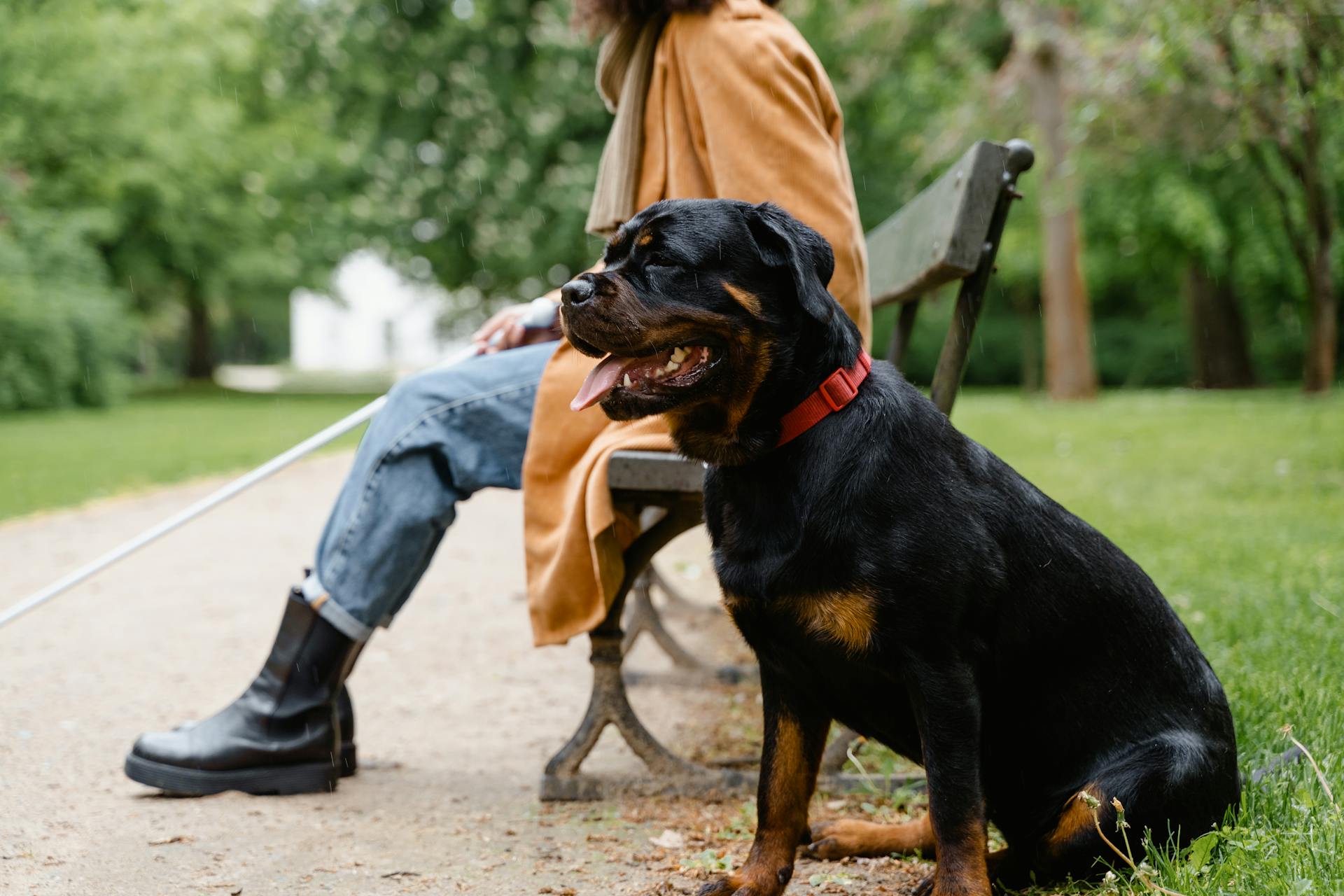
If you're considering bringing a Rottsky into your family, you'll need to be prepared to dedicate time and effort to training and socializing your new pet.
A Rottsky's coat can be rough or smooth, and will require regular grooming to prevent matting and tangling.
The Rottsky's eyes can be blue, bi-colored, particolored, or a combination of brown, depending on the Husky genes.
The average cost of a Rottsky puppy is between $600-$1000, depending on the breeder, location, bloodline, and physical appearance.
Here are some key characteristics to consider:
With proper training and socialization, a Rottsky can make a loyal and loving companion for an active family.
3 Little-Known Facts
Here are three little-known facts that you might find interesting:
The average person spends around 4-6 hours per day on their phone, which is a significant amount of time considering the average person sleeps for 8 hours per day.
You might be surprised to learn that the first smartphone was released in 1992 by IBM, but it wasn't until the iPhone in 2007 that smartphones became mainstream.
It's estimated that over 50% of the world's population now owns a smartphone, which has revolutionized the way we communicate, access information, and conduct our daily lives.
Final Thoughts
Owning a Rottie cross Husky can be a rewarding experience, but it requires time, dedication, and resources.
These dogs are intelligent, loyal, and protective companions that can bring joy to your life. They have the potential to be very stubborn, so patient owners with experience are ideal.
You'll need to start training early, and with the right care, a Rottie cross Husky can be a loyal and loving dog that's highly intelligent and affectionate.
They need a lot of exercise and space to run around, so highly active people who can take them on long runs are best suited. They can weigh as much as 110 pounds, so a cooler climate is recommended due to their long hair.
By providing them with love, attention, proper care, and a stimulating environment, you can enjoy a wonderful companionship with your Rottie cross Husky.
Worth a look: How Long Do Husky Dogs Live
Frequently Asked Questions
What is a rotsky?
A Rottsky is a crossbreed between a Rottweiler and a Siberian Husky, combining the traits of both parent breeds. This unique mix makes the Rottsky a fascinating and energetic companion for experienced dog owners.
How much do Rottskys cost?
A Rottsky puppy typically costs between $600 and $2,000. The price range varies depending on factors such as breeder reputation and bloodline.
What does a Siberian Rottweiler look like?
A Siberian Rottweiler's appearance can vary, but they typically have a coat in shades of black, grey, brown, red, cream, white, or sable, with a nose in black, brown, or liver color. Their unique look is a mix of their Rottweiler and Siberian Husky heritage.
Sources
Featured Images: pexels.com
